
The Mishnah or the Mishna is the first major written collection of the Jewish oral traditions that are known as the Oral Torah. It is also the first major work of rabbinic literature. The Mishnah was redacted by Judah ha-Nasi probably in Beit Shearim or Sepphoris at the beginning of the 3rd century CE in a time when, according to the Talmud, the persecution of the Jews and the passage of time raised the possibility that the details of the oral traditions of the Pharisees from the Second Temple period would be forgotten. Most of the Mishnah is written in Mishnaic Hebrew, but some parts are in Aramaic.
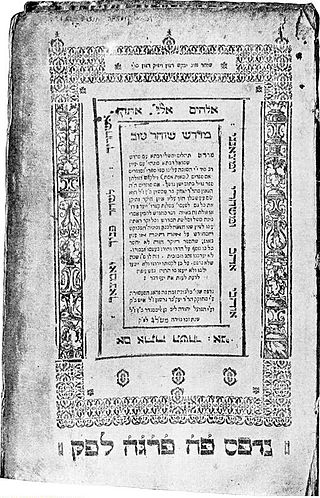
Midrash is expansive Jewish Biblical exegesis using a rabbinic mode of interpretation prominent in the Talmud. The word itself means "textual interpretation", "study", or "exegesis", derived from the root verb darash (דָּרַשׁ), which means "resort to, seek, seek with care, enquire, require", forms of which appear frequently in the Hebrew Bible.

In the law of the United States, the Code of Laws of the United States of America is the official compilation and codification of the general and permanent federal statutes. It contains 53 titles. The main edition is published every six years by the Office of the Law Revision Counsel of the House of Representatives, and cumulative supplements are published annually. The official version of these laws appears in the United States Statutes at Large, a chronological, uncodified compilation.

The Napoleonic Code, officially the Civil Code of the French, is the French civil code established during the French Consulate in 1804 and still in force, although frequently amended.

The International Covenant on Civil and Political Rights (ICCPR) is a multilateral treaty that commits nations to respect the civil and political rights of individuals, including the right to life, freedom of religion, freedom of speech, freedom of assembly, electoral rights and rights to due process and a fair trial. It was adopted by United Nations General Assembly Resolution 2200A (XXI) on 16 December 1966 and entered into force on 23 March 1976 after its thirty-fifth ratification or accession. As of June 2022, the Covenant has 173 parties and six more signatories without ratification, most notably the People's Republic of China and Cuba; North Korea is the only state that has tried to withdraw.
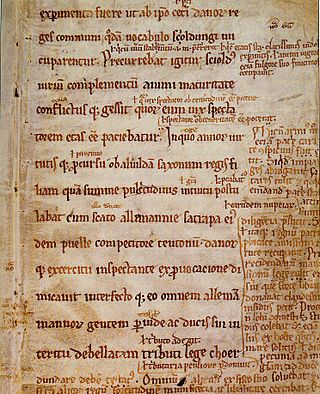
A gloss is a brief notation, especially a marginal one or an interlinear one, of the meaning of a word or wording in a text. It may be in the language of the text or in the reader's language if that is different.
The Prescriber's Digital Reference (PDR) is a compilation of manufacturers' prescribing information on prescription drugs, updated regularly and published by ConnectiveRx.
In American law, the American Law Reports are a resource used by American lawyers to find a variety of sources relating to specific legal rules, doctrines, or principles. It has been published since 1919, originally by Lawyers Cooperative Publishing, and currently by West and remains an important tool for legal research.
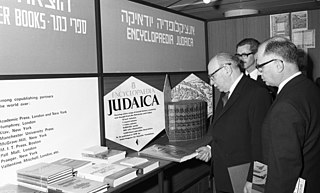
The Encyclopaedia Judaica is a 22-volume English-language encyclopedia of the Jewish people, Judaism, and Israel. It covers diverse areas of the Jewish world and civilization, including Jewish history of all eras, culture, holidays, language, scripture, and religious teachings. As of 2010, it had been published in two editions accompanied by a few revisions.
Hong Kong Basic Law Article 46 is an article in the Basic Law of Hong Kong. The article sets the term of the Chief Executive of Hong Kong (CE).
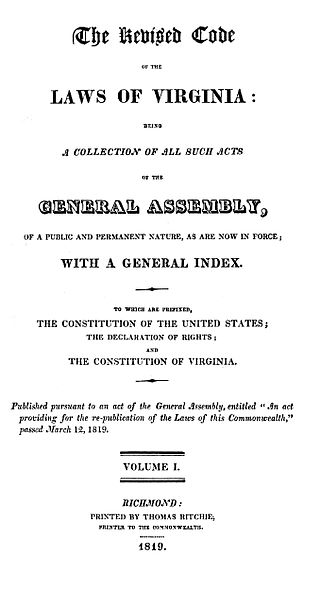
The Code of Virginia is the statutory law of the U.S. state of Virginia, and consists of the codified legislation of the Virginia General Assembly. The 1950 Code of Virginia is the revision currently in force. The previous official versions were the Codes of 1819, 1849, 1887, and 1919, though other compilations had been printed privately as early as 1733, and other editions have been issued that were not designated full revisions of the code.
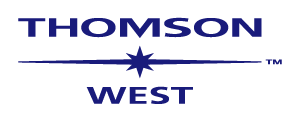
West is a business owned by Thomson Reuters that publishes legal, business, and regulatory information in print, and on electronic services such as Westlaw. Since the late 19th century, West has been one of the most prominent publishers of legal materials in the United States. Its headquarters is in Eagan, Minnesota; it also had an office in Rochester, New York, until it closed in 2019, and it had an office in Cleveland, Ohio, until it closed in 2010. Organizationally, West is part of the global legal division of Thomson Reuters.
The New South Wales Law Reports (NSWLR) are the authorised reports of the superior courts of New South Wales, Australia. The reports are published by the Council of Law Reporting for New South Wales.
The Model Business Corporation Act (MBCA) is a Model Act promulgated and periodically amended by the Corporate Laws Committee of the Business Law Section of the American Bar Association (Committee). The MBCA had been adopted by 36 states and other jurisdictions. The MBCA provides a modern body of statutory corporate law that is regularly updated by the Committee based on judicial decisions, recent legislative enactments and other legal and technological developments. It is a well-organized and clearly-written statute for business (stock) corporations that covers a number of areas, including formation, governance and director conduct and liability. The MBCA has been influential in shaping standards for United States corporate law.

Journal of the Physical Society of Japan (JPSJ) is a monthly, peer reviewed, scientific journal published by the Physical Society of Japan (JPS). It was first published in July 1946. The editor-in-chief was A. Kawabata until August 2010. The impact factor for JPSJ in 2017 is 1.485, according to Journal Citation Reports.

The Web of Science is a paid-access platform that provides access to multiple databases that provide reference and citation data from academic journals, conference proceedings, and other documents in various academic disciplines. It was originally produced by the Institute for Scientific Information. It is currently owned by Clarivate.
A preliminary ruling is a decision of the European Court of Justice (ECJ) on the interpretation of European Union law that is given in response to a request from a court or a tribunal of a member state. A preliminary ruling is a final determination of European Union law, with no scope for appeal. The ECJ hands down its decision to the referring court, which is then obliged to implement the ruling.

The Hong Kong Bill of Rights Ordinance (HKBORO), often referred to as the Hong Kong Bill of Rights, is Chapter 383 of the Laws of Hong Kong, which transposed the International Covenant on Civil and Political Rights so that it is incorporated into Hong Kong law.
Business History is a peer-reviewed academic journal covering the field of business history. It was established in 1958 by Liverpool University Press and is now published by Taylor and Francis. The joint editor-in-chief are Stephanie Decker, Christina Lubinski, and Niall MacKenzie.

WIPO Lex is an online global database launched in 2010, which provides free public access to intellectual property laws, treaties and judicial decisions from around the world. The World Intellectual Property Organization (WIPO) maintains and develops the database.













